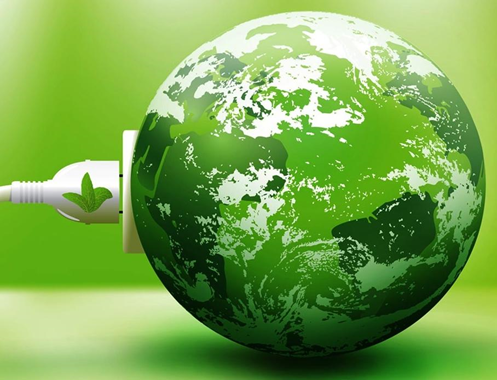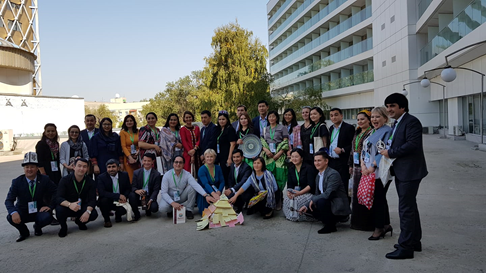
Source: https://recyclemag.ru/news/ekologi-vipustili-glossarii-zelenaya-ekonomika

The Role of Youth in Promoting Responsible Consumption and Production in the Post COVID-19 Era
In recent decades, socio-economic progress has an increasingly negative impact on the environment, and the issue of rational consumption and production has become one of the main topics on the global agenda. Violation of the dynamic bio-equilibrium, depletion of natural resources leads to the brewing of environmental disasters throughout the world.
The COVID-19 pandemic, which has been rapidly spreading around the world since the end of 2019, has exposed all existing problems and clearly demonstrated the devastating consequences of human activity. On the other hand, it had enabled humanity to slow down and start thinking about the future as well as to redefine priorities and values to achieve SCP. The new opportunities for development have opened up for humanity, especially in the field of environmental protection. Environmentalists can act as agents of «green change», and approaches such as «green recovery», «rebuilding better than it were», and «risk-aware development» are important thematic areas that many governments and international organizations are working on.
The current crisis provides an opportunity to develop a strategy for a deep systemic transition to a more sustainable economy, where nature and technological progress must coexist in balance. Responsible Consumption and Production, as one of the 17 Sustainable Development Goals set by the UN for the period up to 2030, primarily implies:
• efficient use of resources and energy;
• sustainable infrastructure;
• universal access to basic social services;
• decent work and green jobs;
• ensuring a better quality of life for all.
It is well known that the Central Asia is one of the most sensitive regions in the world to climate change. The issues of adaptation and mitigation to climate change, ensuring access to clean and safe drinking water, preserving the unique mountain, forest, steppe and desert ecosystems and biodiversity of the region are the basic priorities of the state policies in Central Asia.
The need for regional cooperation has existed since independence of the Central Asian countries to the present days. Being aware of the importance of and need for this kind of cooperation, the governments of five countries created such organizations as the International Fund for Saving the Aral Sea (IFAS) and its institutions - ICWC and ICSD, and the Regional Environmental Centre for Central Asia (CAREC, 2001) as an independent platform for regional cooperation.
This year CAREC celebrates its 20th anniversary, which implements a unique mandate – assistance to the countries of Central Asia in solving national and regional problems in the field of environmental protection. The regional CAREC events of 2021 - Central Asia Climate Change Conference (CACCC): «Regional cooperation for climate-resilient future» and the 12th Central Asia Leadership Programme on Environment for Sustainable Development (CALP): «Sustainable Consumption and Production and Circular economy policies and tools as drivers to green recovery and building forward better» have taken the initiative to provide support to celebrate the 20th anniversary of CAREC.
CALP is the only regular capacity-building and training programme in Central Asia, that has become a recognized platform for the development of youth regional cooperation. Over 11 years from 2010 to 2020, more than 330 young people from five countries of Central Asia and Afghanistan, representatives of state environmental, water management and energy sectors, non-governmental organizations, universities and environmental businesses, have been trained within Central Asia Leadership Programme.
This year, we have the unique opportunity to discuss issues of sustainable consumption and production, circular/green economy, water and energy resources management and their significant impact on food supply and security, ecosystem services, transition towards a low-carbon, resource-efficient and circular economy under the 12th Central Asian Leadership Program on Environment for Sustainable Development (CALP), which will be held from September 20 to 24, 2021. Moreover, stakeholders and partners of the CALP are planning to discuss the impact of the COVID-19 pandemic on the development of the countries of Central Asia and Afghanistan in terms of economic recovery as well as new challenges faced by health and education systems.
The 12th CALP will be organized by CAREC in cooperation with the European Union SWITCH-ASIA Programme, the OSCE Programme Office in Nur-Sultan, the OSCE Secretariat, the EU Delegations in Central Asia, and the World Bank. Along with CAREC, the Kazakh-German University (DKU) is a co-partner in this project.
The 12th CALP, which is aimed at promoting action-oriented regional platform for youth dialogue, is expected to bring together members of green business, young environmental leaders from government agencies dealing with SCP, civil society organizations in Central Asia and Afghanistan working on green economy, resource efficient economy and circular economy.
SWITCH-Asia is the largest sustainable consumption and production (SCP) program supported by the European Union across Asia. In line with the priorities of the European Green Deal, the program aims to promote sustainable and inclusive growth in Asia, and to support partner countries in their transition towards a low-carbon, resource-efficient and circular economy.
Representatives of the following groups will take part in the CALP 2021:
- young environmental leaders from government agencies dealing with SCP and green development - ministries of agriculture, environment, water and energy;
- representatives of green business;
- civil society organizations of Central Asia and Afghanistan working in the field of SCP, green economy, resource efficient economy and circular economy.
The partners of the 12th CALP very much hope and believe that the Leadership Programme in 2021 will encourage young leaders in Central Asia in SCP issues, contribute to the implementation of SCP policies at the national level, and provide an innovative and action-oriented regional platform on SCP and a green economy for sustainable youth dialogue in Central Asia and raise awareness of sustainable consumption and responsible consumer behavior among communities in Central Asia and Afghanistan.
